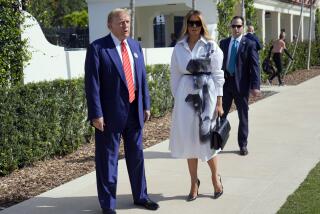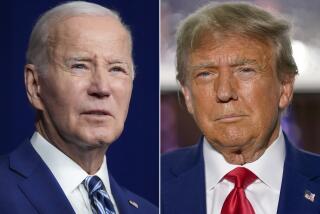Florida primary was everything it promised, and less
Reporting from Tampa, Fla. — Congratulations, Florida, you’ve gotten everything you wanted, along with more than $20 million to boot!
The eyes of the nation, to use a hoary phrase, are on the Sunshine State and today’s big Republican presidential primary. (At least those eyes that aren’t more raptly fixed on Ferris Bueller’s upcoming Super Bowl appearance, Facebook’s IPO or Demi Moore’s meltdown).
That is just the way Florida politicians, television stations, Republican political consultants and other ancillary beneficiaries hoped it would be.
Florida is big and politically important. Its 29 electoral votes are the most of any swing state, ensuring plenty of attention from presidential candidates the rest of this election year. In addition, Florida will host the Republican National Convention in Tampa in August (the weather should be divine!) and an October presidential debate in Boca Raton.
Still, Florida wanted more.
So the state ignored the rules set by the two major political parties and elbowed its way forward on the campaign calendar, moving its primary (previously held in March) up to today and setting off a chain reaction that resulted in the first votes of this years presidential contest being cast as soon as the New Year’s confetti was swept off the floors in Des Moines.
The argument was that Florida is a more vast, more diverse state than those preceding it -- Iowa, New Hampshire, South Carolina -- and that much is undeniably true. Spend five minutes at a convenience market in any of Florida’s major cities and you’ll see people of more colors and ethnic backgrounds than you will in two weeks in Iowa or New Hampshire.
All of that diversity was supposed to broaden the political debate and bring to the campaign a discussion of vital issues that were neglected in those smaller, more homogeneous states.
That hasn’t happened.
Former Massachusetts Gov. Mitt Romney has slammed Newt Gingrich for his lucrative Freddie Mac contract in Florida, just as he did in Iowa. Former House Speaker Gingrich has questioned Romney’s constancy and convictions here, just as he did in New Hampshire. Former Pennsylvania Sen. Rick Santorum has said neither one are true conservatives, as he argued in South Carolina. Rep. Ron Paul of Texas still hates the Fed and wants to drastically curtail U.S. engagement abroad.
The issues the candidates have discussed -- electability, the economy, immigration, personal ethics -- are precisely the ones they have taken up elsewhere, including the 19 nationally broadcast debates that have made the idea of “local” campaigning seem positively quaint.
There are, of course, exceptions. Inevitably, Fidel Castro surfaced in Florida and gave the candidates a chance to denounce the former Cuban leader and suggest, as Gingrich did, that a place setting awaits him in Hell.
Gingrich also visited the economically strapped Space Coast and grandly promised to colonize the moon by the end of his second term. (That gave Romney and his supporters a jibe -- “to the moon!” -- that pleased and delighted fans of the old show “The Honeymooners.”)
But although the backdrop changes -- farms in Iowa, diners and old mill towns in New Hampshire, stubby palm trees in South Carolina and bigger ones in Florida -- for the most part the issues the candidates have discussed here are no different than they would have been had Florida simply waited its turn.
So are state leaders reconsidering their decision to jump the queue? Of course not.
There’s that $20 million-plus that has been spent on TV advertising. (The fact that nine out of 10 of the ads flooding the airwaves have been negative hasn’t made viewers happy, but no one blames their local lawmaker for that.)
Florida politicians have seen their importance grow along with the significance of Tuesday’s vote, which, to them, only underscores their wisdom.
The price -- sacrificing a few dozen delegates to the Tampa convention -- is a mere pittance. Indeed, look for Florida’s delegation to be at full strength in August. Whoever emerges as the nominee will doubtless be smart enough not to antagonize the supporters he needs in November by forcing them to stand outside the convention hall, fuming.
So given Florida’s experience, look for other states to push ahead on the calendar in 2016, assuming the major parties even try to impose some order on their nominating processes.
Which may mean Iowa caucuses along with turkey on Thanksgiving Day 2015.
More to Read
Get the L.A. Times Politics newsletter
Deeply reported insights into legislation, politics and policy from Sacramento, Washington and beyond. In your inbox three times per week.
You may occasionally receive promotional content from the Los Angeles Times.











